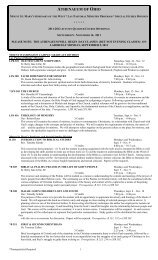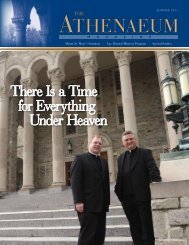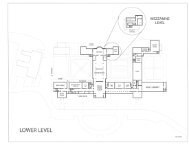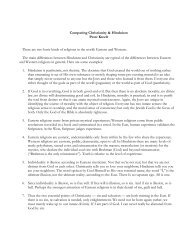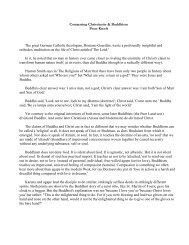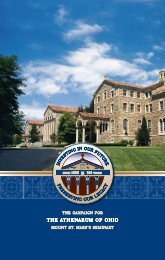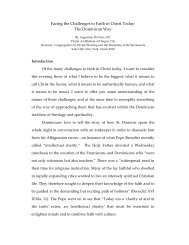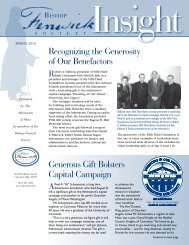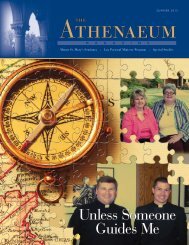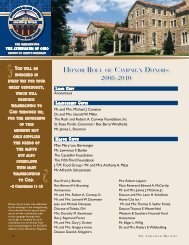Notes from Gathered for the Journey Six (6) essays David McCarthy
Notes from Gathered for the Journey Six (6) essays David McCarthy
Notes from Gathered for the Journey Six (6) essays David McCarthy
You also want an ePaper? Increase the reach of your titles
YUMPU automatically turns print PDFs into web optimized ePapers that Google loves.
<strong>the</strong>se is a desire to be superhuman This modern notion actually takes us back toour first temptation, Adam and Eve‘s desire to become like gods. (Gen. 3:5). Thecontingencies of our own particularity do not make us less free; <strong>the</strong>y are simply<strong>the</strong> character of human freedom.‖ (171)Practice made Perfect—<strong>the</strong> Beautiful LifeThe more we practice Christian virtue, <strong>the</strong> more creative and free one becomeswithin <strong>the</strong> medium—just as <strong>the</strong> professional musician, <strong>the</strong> veteran jazz artist.The saint can improvise because <strong>the</strong> saint is a master.Our freedom reflects <strong>the</strong> image of God within us.Good acts participate in <strong>the</strong> good ―that moves us toward God when we act inaccord with reason and our human nature.‖ (172)Key: ―Freedom is not an end in itself, but is directed to our fulfillment as humanbeings, ultimately in communion with God.‖ Law and grace work within us tohelp us toward that goal. (172)Sin—Quicksand drawing us away <strong>from</strong> <strong>the</strong> Good—and Human FulfillmentMisdirected acts (i.e. sin), ironically, act as a ―limitation to our freedom.‖Allowing sin to metastasize into vice cripples our ability to do <strong>the</strong> good—our lensand will become distorted and drawn down, away <strong>from</strong> <strong>the</strong> light.―The more we sin, <strong>the</strong> less free we are to act in ways that draw us closer to God.Grace and law are two different means God uses to liberate us <strong>from</strong> our ownef<strong>for</strong>ts to thwart our freedom.‖ (172)V. Law and Consciencepp. 172-175―Conscience is bound by truth.‖ Hearing God’s voice unimpededWhat is <strong>the</strong> relationship between law and conscience?Key—<strong>the</strong> freedom is freedom <strong>from</strong> constraint, oppressive laws, and socialcustoms (172)―Freedom of conscience, <strong>the</strong>re<strong>for</strong>e, <strong>from</strong> a Christian point of view, is not freedom<strong>from</strong> God‘s law; ra<strong>the</strong>r it is freedom <strong>from</strong> human interference in order to chooseand move toward <strong>the</strong> good—an inclination that is carried within us.‖ (173)Dillon and <strong>McCarthy</strong> explicate <strong>the</strong> model of conscience as capacity, process andjudgment through St. Thomas‘ reflection. (cf. 173)Conscience is <strong>the</strong> interaction of freedom and natural law—<strong>the</strong> power of will andmoral truth meeting and both shaping character as well as responding to moralprinciples. (cf. 174)Fundamental Moral Theology Page 44 of 54Class <strong>Notes</strong> – Fa<strong>the</strong>r Michael Seger



